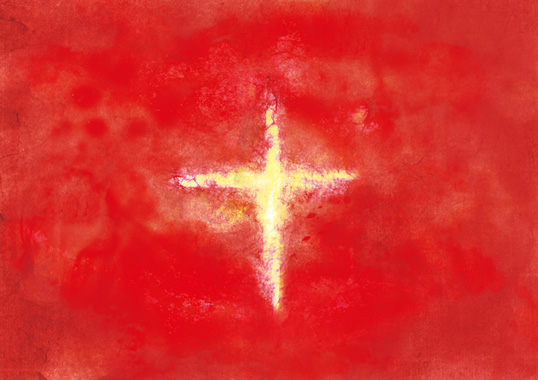Πηγή: .politicaltheology.
[
This paper was presented on November 18, 2012 at the Annual Meeting of the American Academy of Religion, in a joint session sponsored by the Theology and Continental Philosophy and Theology and Religious Reflection groups.]
The recent interest shown in religion and, specifically, Christianity, by otherwise non-religious thinkers has been something of a boon for theologians and the like-minded. Even when such non-Christian appropriations of theology offer a presentation of Christianity radically different from received orthodoxy, the very fact that the effort has been made is often taken as a signal of the continuing preeminence of a largely traditional Christian thought and practice. As Paul J. Griffiths has suggested, such thinkers, left without any other viable critical options, are “yearning for [the] Christian intellectual gold” that the church has always held in reserve. Because of this, their services can easily be enlisted for theology, since, as John Milbank has often suggested, it is theology alone that offers any real alternative.
Such readings of this so-called post-secular “turn to religion,” however, tend to move too quickly to theology, and this is especially the case with Agamben. Although some may wonder if Agamben’s putative appreciation of theology means that he is in fact a Christian, his various forays into theology—notably,
The Time that Remains and, more recently,
The Kingdom and the Glory—present, I suggest, a much different picture. Specifically, among other things Agamben’s reading of the theological tradition represents a concerted effort to profane that tradition, to render it inoperative for a new use, a use that I characterize as non-non-theological or non-non-Christian.
So to begin: towards the end of the Preface to
The Kingdom and the Glory, Agamben tells us that the “empty throne, the symbol of Glory, is what we need to profane in order to make room, beyond it, for something that, for now, we can only evoke with the name
zoe aionios, eternal life.”
To understand what glory does and why it needs to be profaned, we can start by noting that the functioning of the governmental machine depends ultimately on the fracture between being and praxis and the various attempts to suture this fracture in different yet interrelated domains. It is this fracture between being and praxis that we see reflected in the discursive distinction between theology and
oikonomia. This distinction, as Agamben shows throughout
The Kingdom and the Glory, marks Christian thought as dipolar, suspended between a series of divisions that employ different, though complimentary, rationalities: for instance, the division between the being of God and God’s government of the world, transcendent order and immanent order, Kingdom and Government, and general providence and special providence. Glory is, according to Agamben, essentially the place where an attempt is made to suture these divisions, so as to assure the continued functioning of the theo-governmental machine.
Agamben examines these sutures in detail throughout
The Kingdom and the Glory, but we can focus specifically on Agamben’s discussion of the relationship between immanent trinity, which refers to God as God is in Godself, and economic trinity, which refers to God for us in the praxis of salvation. The distinction between immanent trinity and economic trinity, as should be clear, repeats the divisions we have just mentioned and, in this sense, recapitulates the fundamental fracture between being and praxis that the theo-governmental machine attempts to suture. The distinction between immanent trinity and economic trinity does not mean, of course, that we are dealing with two different trinities, as if the inner life of the Godhead is somehow substantively distinct from God’s economic activity in salvation history and the government of the world. Nevertheless, despite this apparent identity, there is a real distinction to be had between immanent trinity and economic trinity, meaning that we should avoid either confusing the two or collapsing one into the other. What is at issue, rather, is the reciprocity between the two, the relationship between the immanent and the economic. If Agamben is correct, the relationship between them is not so much thought as expressed doxologically, in the liturgical formalization of thanks, praise, and adoration. Otherwise put, it is in glory that immanent and economic trinity meet and disjunctively interpenetrate each other. “
The economy glorifies being, and being glorifies the economy,” Agamben writes. “And only in the mirror of glory do the two trinities appear to reflect each other; only in its splendor do being and economy, Kingdom and government appear to coincide for an instant.”
Yet only for an instant. Although the thanks, praise, and adoration due to God presuppose the economy of salvation, an economy that, in turn, reflects glory, the relationship between immanent trinity and economic trinity remains essentially asymmetrical. The economy, God’s government of the world, is essentially finite, and will come to its completion or end in the eschaton, when it will be reabsorbed into the immanent trinity, into God’s glory. Although glory, then, serves as the means to express the reciprocity between immanent trinity and economic trinity, it also, in the end, signifies the latter’s dissolution. However, the re-absorption of the economic into the immanent, of act into being, also exposes the essential vacuity of glory.
If, as we have said, the economic comes to an end in its reabsorption into the immanent at the eschaton, then “glory coincides with the cessation of all activity and all works.” Glory is, as Agamben writes, “what remains after the machine of divine
oikonomia has reached its completion.” This “postjudicial inoperativity,” as Agamben refers to it, in which all human and divine works come to an end, is, then, an eternal Sabbath, for both God and humans. But if the goal of all things is to become inoperative, to cease activity, then this also means that glory itself is really nothing more than inoperativity. Behind glory is really nothing, which is another way of saying that the center of glory is empty. Glory substitutes itself for this emptiness, filling the latter in with “the splendor of its insignia.”
Glory is thus essential to power to the extent that it seeks the “capture and inscription in a separate sphere of the inoperativity that is central to human life.” Human life in its essence, if we can even use that word, is for Agamben inoperative, without a predetermined purpose, whether we understand this purpose metaphysically or materially. The human being is, Agamben says, “the Sabbatical animal par excellence.” Yet it is exactly this inoperativity defining the human that enables operativity, human production and labor. In order for the governmental machine to function, then, it has to seize this inoperativity and transpose it into glory, a transposition that simultaneously attempts to conceal the emptiness at its center. It is in this way that “inoperativity is the political substance of the Occident, the glorious nutrient of power.”
The symbol of the empty throne crystalizes the relationship between inoperativity and glory. Although we find the image of the empty throne in various contexts, Agamben notes that its meaning culminates in Christianity, with the
hetoimasia tou thronou. In the Christian context, the empty throne does not refer primarily to regality, as may be the case in other contexts, but to glory: it sits prepared, awaiting the glory of God. The throne’s emptiness, however, should not only be understood in its correlation to the fullness of glory; it is, rather, constitutive, part and parcel of the inoperativity that lies at the heart of glory and that glory must seize to operate. For this reason, “The void is the sovereign figure of glory.”
Now, the problem, here, is not inoperativity as such but its capture in the apparatus of glory, which for Agamben means that we must think inoperativity outside the apparatus of glory, so as to restore human beings to the inoperativity that defines their essence. In other words, we must profane the empty throne, the symbol of glory, in order to make room for what Agamben tentatively calls eternal life.
To understand what it means to profane, we can turn to Agamben’s essay “In Praise of Profanation.” Here, Agamben argues that religion does not primarily refer to the binding-together of the divine and the human. Rather, it refers to their separation into the sacred and the profane and the attention given towards this separation. That is, religion refers in the first instance to “that which removes things, places, animals, or people from common use and transfers them to a separate sphere.” The religious or, perhaps more broadly, the sacred, establishes itself and the domain proper to it through separation, through the consecration of various objects, broadly construed. The consecration of these objects removes them from the realm of normal, ordinary use, isolating them in a zone of inaccessibility that rests on the manufactured division between the sacred and the profane. The paradigm for the passage from the profane to the sacred is, in the religious context, sacrifice, the act of which removes the victim from the profane sphere, giving the victim over to the realm of the divine. Indeed, for Agamben sacrifice represents separation in its pure form, and in this sense it can be understood as the apparatus that founds and maintains the division between the sacred and the profane.
So understood the division between the sacred and the profane is far from absolute: it does not refer to any supposed metaphysical or natural qualities that inhere to certain objects but constitutes itself through the act of separation as such, meaning that virtually any object can become sacred, so long as set apart from the realm of normal use. Being sacred or, conversely, profane, is only the result of passing an object from one sphere to the other. If, however, the division between the sacred and the profane relies on the act of separation as such, then it is always possible to return an object that has been made sacred to the realm of the profane.
We should not, however, confuse profanation, the return of an object to common use, with secularization. Whereas secularization merely transfers power from one sphere to another without altering its form, profanation “neutralizes what it profanes,” in the sense that it “deactivates the apparatuses of power and returns to common use the spaces that power had seized.” Otherwise put, profanation renders objects inoperative, making them available for a new use that ignores any proper or sacred sense that the object may have once had.
Agamben gives numerous examples of profanation throughout his works, but we can focus more specifically on Agamben’s reading of Pauline
klesis. Agamben’s discussion of Pauline
klesis, of course, constitutes a significant portion of
The Time that Remains. It reappears, however, in
The Kingdom and the Glory at a turning point in the “archaeology of glory,” where Agamben shifts his attention to
zoe aionios, eternal life, as the means to begin to think inoperativity outside the apparatus of glory. In Judaism and the New Testament,
zoe aionios does not merely refer temporally to the future eon but also to “a special quality of life and, more precisely, the transformation that human life undergoes in the life of the world to come.” The notion is found in Paul, but Paul also takes it as characteristic of life in messianic time, the time of the now. Such is the sense of Paul’s use of
hos me or “as not,” which Agamben takes as a technical term in the Pauline lexicon, used to indicate the meaning of messianic life as
klesis, that is, calling or vocation. For Agamben
klesis is not the messianic repetition of factical conditions or a calling to something more authentic or higher.
Klesis, under the pressure of the
hos me, is rather the “revocation of every vocation,” in the sense that “it revokes the factical condition and undermines it from within without altering its form.”
Such is the sense of Paul’s “weeping as not weeping,” “rejoicing as not rejoicing,” “buying as not possessing,” “using the world as not using it up” (I Cor. 7:29-31). So understood the messianic
hos me coincides with profanation. Like the act of profanation with respect to the sacred, messianic
klesis does not destroy factical conditions but reworks them from within through their neglect, which renders them inoperative. In Agamben’s reading of Paul, the
hos me indicates the “generic potentiality” that
klesis pries open and it itself is, a potentiality that, again like profanation with respect to the sacred, allows factical conditions to be put to a new use, a use subtracted from proper ends. Messianic life is profaned life, a life constituted in and through profanation. It is this profane life that gets transposed into glory, since the theo-governmental machine cannot function without it.
How, then, should we position Agamben’s analysis of glory with respect to theology? It should be clear, I think, that Agamben’s genealogy is simultaneously critique: to explain how the theo-governmental machine functions is to indicate the points at which it might be put to a halt. We should not confuse Agamben’s appeal to theology in this register, then, with theology itself, as if it were a covert endorsement of theology. It is also the case, however, that when searching for alternatives, Agamben seemingly makes a theological appeal in his insistence on the importance of the messianic dimensions of Paul’s thought and in the notion of eternal life. Nevertheless, we should not confuse this appeal with theology either, at least in the strict sense of the term. Agamben certainly finds an essential inoperativity at work in the “as not” of Pauline
klesis and eternal life, and in this sense these coincide with his own specific concerns. But Agamben attempts to read these and similar notions by isolating them from the ways in which they have functioned in the theo-governmental apparatus, putting them to a new use. Otherwise put, Agamben’s use of theology, in both its negative and positive senses, is an act of profanation. If Agamben claims to find an essential inoperativity at work in theology, it is because this inoperativity itself has been rendered inoperative through the act of profanation, the profanation of the empty throne. Agamben’s use of theology, then, should not be confused with theology proper, but it also should not be confused with a secularization of theology, since this would merely reproduce theology in a different register. Neither theology or an anti-theology, it is, rather, what I could call a non-non-theology or, if you will, a non-non-Christianity.
To label it so puts to a different use Agamben’s discussion in
The Time that Remains of the remnant that results from the messianic division of the law for understanding his own position with respect to theology. The messianic announcement comes out against the ways in which the law divides Jew from non-Jew, but it does not do so through the establishment of a new, universal identity. The messianic announcement, rather, “divides the divisions of the law themselves and renders them inoperative, without ever reaching any final ground.” The messianic announcement divides each term of the opposition Jew/non-Jew from within, leaving a remnant on both sides that does not coincide with either: some Jews are not Jews and some non-Jews are not non-Jews. The messianic remnant, then, is non-non-Jew, and, in this sense, it corresponds to the “as not” of messianic
klesis. The messianic announcement, then, is neither the dissolution of identity nor the establishment of a new identity; it is, rather, a specific type of ignorance with respect to factical conditions, an ignorance that deactivates factical conditions and returns them to inoperativity.
Similar to the way in which the messianic announcement neutralizes factical conditions through the as not, Agamben uses theology as not using it but also as not-not-using it. It is in this sense that we should understand Agamben’s foray into theology as a non-non-theology and his identification with the theological tradition as non-non-Christian.
By way of conclusion, if we are to appropriate Agamben’s work for theology, then, we must do so as not-not-for theology. A non-non-theology certainly cannot take the form of glory, either theoretically or doxologically in thanks, praise, and adoration. Rather, a non-non-theology or, put differently, a profane theology must render its objects inoperative. If theology has traditionally constituted itself through glory, in the attention it gives to divine being and economy, perhaps a profane theology would constitute itself through ignorance and neglect. Such a theology would no longer revel in thanks, praise, and adoration, but treat God and God’s economy as a “disused object,” as essentially inoperative.
Hollis Phelps is Assistant Professor of Religion at Mount Olive College, Mount Olive, NC. He is the author of Alain Badiou: Between Theology and Anti-Theology,
forthcoming from Acumen Publishing in January 2013.









